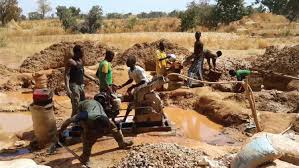Stopping Illegal Mining and Environmental Damage: Government Action Essential for OAU’s Future
By Jimoh Abiba

Illegal mining in Nigeria has escalated into a significant crisis, exerting dangerous impacts on both the nation’s economy and its fragile environment, the situation is getting out of control in Osun. Experts have sounded alarm bells, estimating that a staggering 80% of mining operations within the country are being carried out unlawfully. This widespread illegality not only deprives the government of vital revenue streams but also inflicts irreparable damage on local ecosystems and communities.
Illicit mining is not an issue that is restricted to Osun state as it has become a norm in various areas across the country, like Igbese, Ogbere, Niger Delta, Zamfara, and Borno, among others. This activity started a few years back but has grown to be worse and detrimental to the lives and properties of residents due to unauthorized explosive devices and harmful chemicals like Mercury and Cyanide that are used for Gold and Lead mining. It should be stated that little or no preventive and protective measures are put in place during the activities and there is no economic benefits to the host community.
One of the many case studies is the case of January 16 incident that occurred in Bodija killing 2 persons and injuring 77 others. Seyi Makinde, governor of Oyo state confirmed that the explosion was connected to the devices stored in a warehouse by illegal miners in the state. This shows the great danger that exists if illegal mining activities and their enablers are not curbed.
The recent case is the ongoing Illegal mining activities on Obafemi Awolowo University, Ile Ife campus and its environs, where 11 mining companies claimed to have gotten approval from the Ministry of Solid Minerals. It should be made known that the Nigerian Minerals and Mining Act of 2007 (Section 116 subsection 1 & 2) states that there must be a Community Development Agreement between the mining companies and the host community, and since OAU is the host, there is No such agreement in place. The University PRO further states that approval for mining activities must entail fulfilling all the demands and required by the law
Moreover, illegal mining takes a heavy toll on the environment, leading to deforestation, soil erosion, water pollution, and habitat destruction. These environmental degradation processes compromise biodiversity and ecosystem services and jeopardize the health and livelihoods of nearby communities, who rely on natural resources for their sustenance. It won’t be far-fetched if Illegal miners are some of the sponsors that aid insecurity and terrorism in the country, as even the president of the country stated this fear at the African High-level Meeting on Counter Terrorism in Abuja on April 21, 2024.
“Look at the illegal mining that plagues so many of our nations today. Those who think illegal mining has no connection with financing terrorism are sorely mistaken,” Tinubu said. (https://punchng.com/tinubu-blames-illegal-mining-for-terrorism-funding-2/?amp). With such a conclusion coming from the titular head of the Tinubu regime, one will ordinarily expect that it will swing into action to break up this circle of illegal miners. But this will expecting the impossible. Illegal mining is cash intensive that the working masses cannot on their pull everything needed to be involved. They only serve as diggers doing the dirty work. The business is completely dominated by members of the ruling class, who act directly or through fronts, and if not they employ the wealth so generated to win support for those at the corridors of power. This explain, why they seem untouchable.
While calling upon the Minister of Solid Minerals, Dele Alake, to intervene in this unregulated mining of state resources in Osun state and other affected states in the country. We must sow no illusion, only the organised force of the working masses, as the state and power over the whole of society that will in reality take it upon itself to end this illegal mining of the collective wealth of society, while at the same time putting a place all the necessary safety guards both for workers and for the environment.
The above should however not stop one from calling on the Minister of Education, Prof. Tahir Mamman, to urgently address the issue of land encroachment within universities, particularly at institutions like OAU, where purported ‘IFE indigenes’ and other affected schools are encroaching on university land. This encroachment poses a significant threat to the safety, security, and well-being of students, lecturers, and other occupants within the university premises, as it compromises the integrity of academic facilities and infrastructure. It is essential for the Minister to take decisive action to resolve these land disputes and safeguard the lives and properties of those within the university community.
We call for the nationalization of the mining sector in the country, placing it under the democratic management and control of the working people—comprising workers, peasants, artisans, and youths. This shift in ownership aims to redistribute wealth and power to those who create value through their labour. The revenue generated from the mining sector should be directed towards improving the livelihoods of citizens, ensuring access to basic necessities, and advancing social welfare programs.
